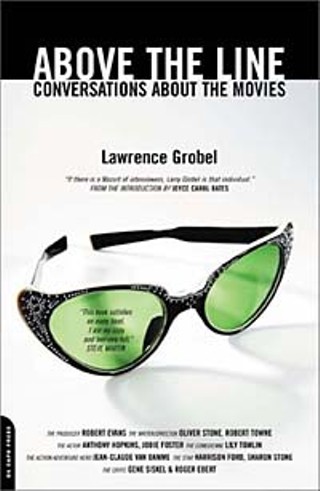True Hollywood Stories
Books About Film
By Clay Smith, Fri., Dec. 15, 2000

Above the Line: Conversations About the Movies
by Lawrence GrobelDa Capo Press, 398 pp., $17 (paper)
A good interview is like a lot of things: It is like a little trip whose destination you may not know much about but enjoy traveling toward; it's like a memorable conversation with someone you've just met. Lawrence Grobel has subtitled his recently published collection of interviews "Conversations About the Movies," so it's apparent that, for him, a good interview is not like a memorable conversation, it just is one. But he has a tape recorder running during his memorable conversations, and occasionally he asks impertinent questions and insists that the person he's talking to respond, like he did in his controversial interview with Gov. Jesse Ventura, who had a few things to say about overweight people. Sometimes Grobel makes this unnatural process seem natural, and sometimes, when he needs to, he makes certain that it doesn't seem natural at all.
Above the Line is a group of interviews with people whose names appear on movie posters, so asking them to reveal themselves beyond their public personas is a bit of a gamble. Grobel repeatedly beats the odds. In the course of interviews -- with, among others, Anthony Hopkins, Jodie Foster, Lily Tomlin, Jean-Claude Van Damme, and Gene Siskel and Roger Ebert -- he continually elicits comments that you won't hear on E! Daily News. (Portions of each of these interviews were originally published in either Playboy or Movieline.) For example, in the summer of 1993, producer Robert Evans (Chinatown, Rosemary's Baby) was excited about the release of his movie Sliver, which eventually bombed. But Evans (who also produced The Saint and The Cotton Club) is familiar with failure and despite his desire to be the Comeback Kid yet again, he comes off as rueful: "It's tough to get up the ladder," he remarks, "but the higher you climb the further down you fall. And everyone always wants to see you fall." At one point, Grobel asks Evans how the business has changed since the Seventies, and he ruminates for a bit before saying, "Do I like it? I hate it. Am I on my knees glad I'm here? I'm on my knees glad I'm here. Because this is the only game in town."
Some of Grobel's legendary subjects say legendary things like that; most of them don't but are intriguing reads nonetheless. Interviewing Harrison Ford, perhaps the most insistently reticent interviewee in this collection, Grobel observes that "the story of your chin scar has been told," then asks, "Do you have any other scars that are hidden?"
"Oh, just the one inside," Ford replies in a presumably cheeky fashion. But Grobel doesn't go for the obvious follow-up question and press him on what his "inside scars" are. A copy of this book should be sent to everyone who works at Entertainment Tonight and Dateline NBC.
He even gets Sharon Stone to drop her preening, schlocky schtick. "You've described growing up as an intense, weird kid who made everybody uncomfortable," Grobel says.
Stone replies, "Sometimes when we're uncomfortable we have an inflated sense of how we affect others. I suspect I had much less effect on others than I imagined at the time that I said that." He asks her how she would describe herself, a routine interview question. "I wouldn't," she says. "I'm so sick of me."
Grobel seems to be highly attuned to the fact that his moxie must be used with discretion to have any effect. The repeated surprises of this book are the result of that insight; intrepid questions pop up when you're not quite expecting them (like when he asks Oliver Stone what he would like to change about the Constitution in the middle of asking him about his drug days). You can dart back and forth throughout Above the Line according to your interest in the various subjects, but reading it front to back is a more satisfying education in fame, in Hollywood, and in the elusive art of personalities revealing themselves.








